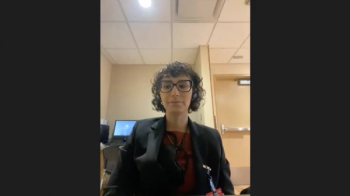
Female Urology
Latest News
Latest Videos

CME Content
More News

Register for AUGS Clinical Meeting 2022, Beyond Urogynecology: Pearls for Best Practice.

The FDA decided a New Drug Application lacked sufficient data to approve tebipenem pivoxil hydrobromide (tebipenem HBr) for the treatment of patients with complicated urinary tract infection.

In this interview, coauthors Connie Huang, MD, and Jason M. Kim, MD, discuss the findings of their recent study, "Urinary Tract Infection on social media: Examining YouTube content as a source of patient educational information."

“We know that, in general, cystectomy in women can disrupt pelvic floor support and innervation, as well as hormonal and sexual function, but there are no good prospective data to help us fully understand pelvic floor complications following the procedure,” said Jacqueline Zillioux, MD.

The FDA is evaluating a new drug application for oral tebipenem pivoxil hydrobromide for the treatment of patients with complicated urinary tract infection, including acute pyelonephritis.

“I think we as urologists have to be proactive in providing information to our patients so that they avoid financial harm and potentially bodily harm from this sort of misinformation,” says Rena D. Malik, MD.

A study presented at the 2022 Society of Urodynamics, Female Pelvic Medicine & Urogenital Reconstruction (SUFU) Winter Meeting evaluated the safety and efficacy of percutaneous tibial nerve stimulation (PTNS) in patients who suffer from female sexual dysfunction.

Jerry G. Blaivas, MD, FACS, debunks some of the common stigmas associated with mesh slings.

A recent study presented at the 2022 Society of Women in Urology Annual Clinical Mentoring Conference investigated the quality of information regarding urinary tract infections on the social media platform Reddit.

“To me, the overwhelming thing is understanding that treatments are, by and large, effective,” says Jerry G. Blaivas, MD, FACS.

"Many people do not examine patients who come in with urinary tract infections or overactive bladder symptoms, and it’s a mistake,” says Rachel S. Rubin, MD.

As an advocate for patients, Svetlana Avulova, MD, stresses the importance of this population of women with bladder cancer and how their desire to preserve sexual function through organ-sparing treatment should be recognized and validated.

“I think discussing it and talking about the different techniques out there [is important],” says Svetlana Avulova, MD.

“I think it's important for people to recognize this revolution that's going on, to see that we're going from what fell to why it fell,” says John O. L. DeLancey, MD.

"It depends on how you're paid and the structure of the compensation model," says Jennifer Miles-Thomas, MD, FPMRS.

Jennifer Miles-Thomas, MD, FPMRS, explains why urology practices need to have female urologists and approaches for recruiting them.

"We're moving from an era where it was all based on judgment, and experience, to an era where treatments will be based on firm evidence of the structural failures present in each patient," says John O. L. DeLancey, MD.

“I think that a lot of the best practices that the surgeons had developed and honed were really excellent communication skills, and…building a trusting physician-patient relationship, where they truly provided an informed consent of all the risks, all the benefits, [and] all the alternatives,” says Una Lee, MD, FPMRS.

"The perceived stigma that this population is promoting antibiotic resistance is not the patient’s fault. It's our responsibility as physicians and urologists to find the answers for our patients," said J. Curtis Nickel, MD.

“I think the surgeon voice is an important voice to be heard because there's not a lot of avenues for surgeons to be able to be honest and share all the things they've learned and all the things they've experienced with their patients,” says Una Lee, MD, FPMRS.

“It is a vaccine that is self-administered by the patient sublingual over 3 months, and that is why it appears to be so safe,” says J. Curtis Nickel, MD.

“Our study strongly suggests that telemedicine can become the mainstay of treatment within FPMRS even after the COVID-19 pandemic has ended,” says Christina Shin, BA.

"Televisits are a valuable form of health care, and I think it could be better reimbursed even after the pandemic ends, especially for telephone visits," says Christina Shin, BA.

“This is an important form of providing health care, especially for people who have a lot of limitations in coming for in-person visits,” says Nitya E. Abraham, MD.

“We found a majority of patients with televisits were satisfied, with many saying it was easy to schedule, easy to comfortably share sensitive information with their doctor, and with the most surprising [finding] being 80% saying they would choose it again over an in-person visit,” says Christina Shin, BA.















